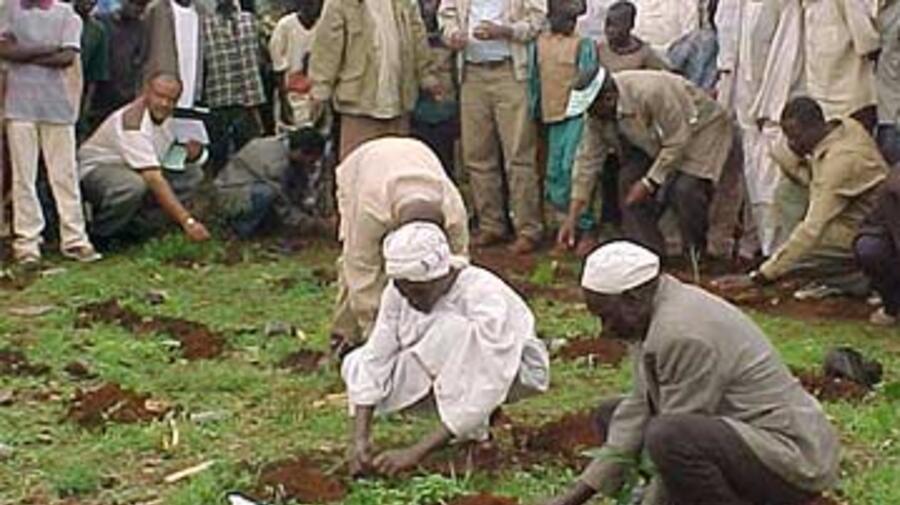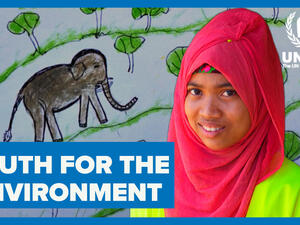Environmental group sows vital awareness among Sudanese refugees
Environmental group sows vital awareness among Sudanese refugees

Members of Roots & Shoots plant tree seedlings at the Sherkole camp in Ethiopia.
SHERKOLE REFUGEE CAMP, Ethiopia, December 22 (UNHCR) - The refugees at Sherkole camp have lost a lot in their lives, but they have also gained a healthy respect for the environment since arriving here. It's an asset that will be immensely valuable once they return to their homes in southern Sudan.
The credit for spreading awareness about issues such as deforestation and environmental protection rests largely with two UNHCR-backed groups operating in the camp - Roots & Shoots, which gathers young idealistic refugees, and the Environmental Working Group composed of their elders.
About 70 young refugees in this camp of almost 14,200 people have joined Roots & Shoots, a youth-driven programme based on a global organisation of the same name that promotes care and concern for the environment, wildlife and humanity. It has made quite an impact since it was set up in Sherkole in 2002.
The volunteers have constructed an office and established a dedicated nursery for raising young trees, which are distributed in the camp. "In the last two years, in addition to our sensitisation efforts, we have raised and distributed more than 24,000 seedlings and fellow refugees were very enthusiastic in planting them," said Kamilo Mario, the energetic leader of Roots & Shoots.
The organisation has also been very successful in raising awareness about the environment among the camp residents, added Mario, who said he fled southern Sudan in 2001 after being arrested and tortured for his pro-democracy activities while a student at Juba University.
The methods used by the Roots & Shoots members to spread the green message in the camp go down very well with the refugees. They use songs, paintings and drama to teach people about the importance of a healthy environment, tree planting and the danger of deforestation.
"Their songs and dramas are both entertaining and enlightening. They are full of meaning," said 21-year-old refugee Amina Tahir. "Thousands attend their performances, and most of those exposed to their messages respond positively."
Thanks to the sensitisation work of Roots & Shoots, Tahir and thousands of other refugees are now aware of the symbiotic relationship between the environment and their own welfare and future. "If our actions result in damage to the environment and the degradation of natural resources, we will not have a harmonious relationship with our hosts, which means our asylum will be put under a question mark," Tahir noted.
But there are still some people who refuse to learn and continue to abuse their environment. This is where the Environmental Working Group (EWG) and its 36 members - six for each district of the camp - enter the picture.
Many refugees describe the EWG as an elected body of environmental legislators and enforcers. With the help of UNHCR and aid agency ZOA Refuge Care, members draft rules and regulations on environmental conservation and seek the approval of the refugee community before adopting them.
For example, one regulation says people can only collect and use dead wood for building or cooking. Under the EWG rules, they must plant 10 saplings if found guilty of cutting live wood. Repeat offenders could lose their wood and tools, or even face detention.
UNHCR has warmly welcomed the work done by the two groups. "The sensitisation efforts of Roots & Shoots, supported by the enforcement mechanisms of the EWG, have contributed a great deal towards the success of our environmental intervention in and around the camps," said Amare Gebre Egziabher, a UNHCR environmental officer.
Aside from supporting the sensitisation efforts of groups like Roots & Shoots, UNHCR measures aimed at protecting the environment include planting seedlings in degraded areas, provision of fuel efficient stoves and promotion of the use of non-wood construction materials such as mud.
UNHCR also believes environmental awareness will benefit the refugees when they finally get home or are resettled. Under the agency's repatriation operation, some 1,000 refugees from Sherkole have returned home since March and more are expected to follow next year as the situation stabilises in southern Sudan.
"These young people who have chosen to participate in the Roots & Shoots clubs will play a major role in bringing a positive change in attitudes towards our environment, both in their country of asylum and in their villages in Sudan when they eventually return home," said UNHCR's Gebre Egziabher
By Kisut Gebre Egziabher in Sherkole, Ethiopia









